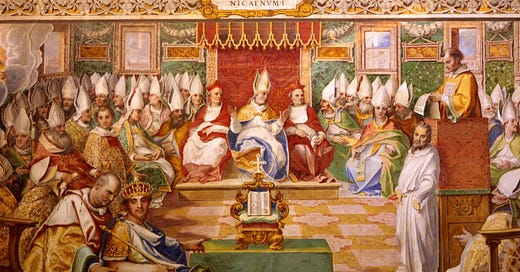The Baxterian National Church
More interesting stuff from Richard Baxter (treatise, Of National Churches) sure to confuse some and shock others.
For Baxter, “the Soveraign Magistrate” (i.e., king) is the “Formal Humane Head of his Kingdom.” If this kingdom is Christian then it “must be name a Chruch: which Custom, Etymology, and Scripture put past question.” Yet, this does not subjugate the church nor forfeit the power of the keys in the Baxterian model. The excess of Erastianism, says Baxter, is that they “give the Magistrate part of the Office of the Pastors, even the Keys of Admission into the Church as a Church, and of Excommunication; which God hath put into the hand of the Pastors, by as immediate a Commission, as he hath put the Sword into the hand of the Magistrate.” It’s a confusion of powers. (Especially when “Pastors are the prime necessary part of the Matter of a Kingdom-Church.”)
That said, Baxter sees no problem recognizing the temporal sovereign as head of the national church (but not particular, pastoral churches, as we’ll see). The misstep of the papists is the assumption that because “Pastors are the Constitutive Heads of particular Churches, so they must be of National Churches, and [further] that every National Church must be unified and specified by one Clergy Soveraignty in one person, or in a Colledge or Aristocracy.” In other words, that all Christian kingdoms must have a “Priestly Head.”
Yet another extremist view for Baxter is that of separatists and Anabaptists who “cry down National Churches with scorn, and run away from National concord, into endless Divisions and Sects.”
Admittedly, a National Church “it is not univocally a Church of the same species or rank as a Pastoral Church is, but is more eminently, and as fitly called a Church, as Israel was.” A National Church comprehends the whole national community.
Baxter seems to reason that because particular (pastoral) churches are obvious and essential, the mode or means of regulation of membership in this “Confederacy” must be found in the chief magistrate who is necessarily head of the kingdom (as was even the case under papal rule, at least in an immediate sense).
The illustrative analogy presented: A college may distribute credentials for qualifying physicians, and, in turn, a patient may decide who his physician will be. The physician decides what medicine to administer to the patient. But before all of that takes place, the king decides who will be admitted to the kingdom and makes “Laws forbidding poisonous Drugs and abuses of Physicions [sic].”
In the same way, “Ordainers” judge who is fit to pastor. The people select their pastor, and pastors (or groups of pastors) determine what doctrine is fit to preach, who will receive the sacraments, and who will be excommunicated. “[B]ut the King judge[s] whom he will allow, maintain, or tolerate as Members of the Christian Kingdom or National Church.”
Baxter is more or less trying to work out the Constantinian model. Don’t miss this aside: “In the Execution of his Institution [of the church], Christ in the time of Constantine, and after, made Judea itself a National Church as far as a Province of the Empire may be called a Nation.” A lot of normie evangelicals are going to hate that kind of high Providentialism from Baxter! Christ himself rolled out the fullness of his Church by and through Constantine. (A fulfillment of Matthew 28 and Mark 16.)
In due time the Kingdoms of the World were made the Ringdoms of the Lord and of his Christ, Rev. 11. & 19.
More importantly, Baxter does not make nation and empire antithetical. Judea is a National Church because it is a distinct nation within the empire. Yet, the Empire itself was a “One Christian Kingdom,” a fulfillment of the promise of Christ, by the way (i.e., “long before promised by Christ”). Locales like Judea, however, were permitted to elect subsidiary kings and maintain local customs, et cetera. Therefore, they too are properly called a National Church.” Indeed, it was “more eminently Christian than any other Nation [of the same size].”
The basic point seems to be that Christendom was an empire of national churches, a Christian kingdom of Christian nations. This fits with Baxterian’s dream scenario in Moral Prognostication (1661) wherein the “primitive” model for him is the Constantinian order—a confederacy of churches and home and a confederacy of Christian nations (“national churches”) abroad all working in concert.
Love it or hate it, the (American evangelical) reader has to admit that they’re not used to hearing
*I’ll treat Baxter’s view of citizenship and toleration next.



